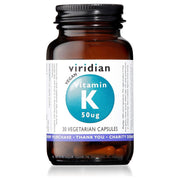100,000+ Orders Shipped
Call us free: 0800 098 8888
Family Run 40 Years +
Money Back Guarantee
Vitamin K1
Can’t find what you are looking for? Contact Us and we will look to get it for you (at a great price and no delivery charge). If you are the first person to suggest a new product to us that we start to keep in stock, we’ll even send you one for free!
Vitamin K1 is a medication used for preventing and treating vitamin K1 deficiency, which reduces the risk of blood clots forming in the body.
Most people get most of their vitamin K from eating leafy greens. However, some people may need to take supplements.
Food Sources of Vitamin K1
Plants produce most of the dietary forms of vitamins K. Humans consume these plant-based foods for their nutritional value.
Here's a list of some vegetables that contain large amounts of vitamin K1. Each number represents the quantity of vitamin K1 in one cup of the cooked vegetable (in milligrams).
- Collard greens: 1,059 mcg
- Spinach: 889 mcg
- Turnip greens: 529 mcg
- Broccoli: 220 mcg
- Brussels sprouts: 218 mcg
- Kale: 1,062 mcg
Differences Between K1 and K2 in the Body
Vitamin K has several functions including activating proteins that help regulate coagulation (clot formation), heart health, and bone health.
Because of differences in absorption and transportation to various parts of the body, vitamins K1 and K2 may have profoundly different impacts on your health.
Vitamin K1 from plant sources is poorly absorbed by the human digestive system. A recent estimate suggests that less than 10 percent of the K1 found naturally in plants is actually absorbed into the bloodstream.
Health Benefits of Vitamin K1 and K2
Studies investigating the health benefits of vitamin K have suggested that it may benefit blood clotting, bone health and heart health.
What Is Vitamin K?
Vitamin K is a group of fat-soluble vitamins that share similar chemical structures.
Vitamin K was accidentally discovered in the 1920s and 1930s after restricted diets in animals led to excessive bleeding (1Trusted Source
Although there are several different types of vitamin K, the two most often found in the human diet are vitamin K1 and vitamin K2.
Vitamin K1, also called phylloquinone, is mostly found in plant foods like leafy green vegetables. I
How to Get Enough Vitamin K
The recommended adequate intake for vitamin K is based only on vitamin K1 and is set at 90 mcg/day for adult women and 120 mcg/day for adult men (22Trusted Source
This can easily be achieved by adding a cup of spinach to an omelet or salad, or by adding a 1/2 cup of broccoli or Brussels sprouts as a side for dinner.
Why do people take vitamin K?
Low levels of vitamin K can raise the risk of uncontrolled bleeding. While vitamin K deficiencies are rare in adults, they are very common in newborn infants. A single injection of vitamin K for newborns is standard. Vitamin K is also used to counteract an overdose of the blood thinner Coumadin.
While vitamin K deficiencies are uncommon, you may be at higher risk if you:
What Is Vitamin K?
Most people get most of their dietary intake of vitamins from plants. Phylloquinones (vitamins K) make up about 75–90 percent of all dietary intake of these nutrients.




